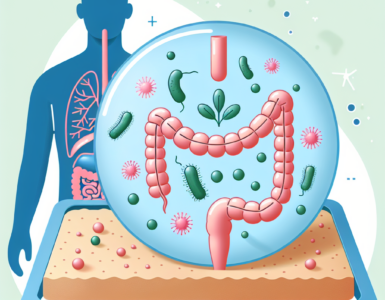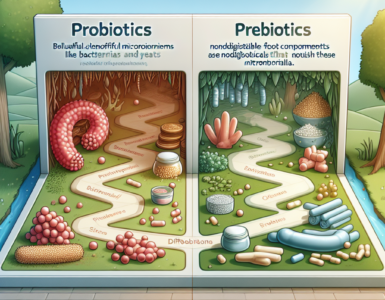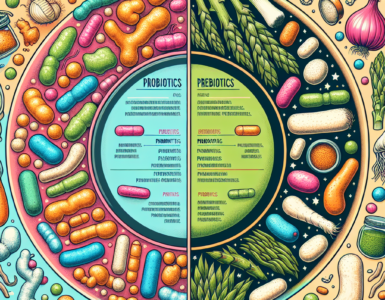A balanced diet is essential for optimal health as it provides the body with all the necessary nutrients, vitamins, and minerals needed to function properly. When someone is consuming a diet that is balanced, they are not only taking care of their physical health, but they are also doing wonders for their mental health and overall well-being.
Understanding a Balanced Diet
Before one can understand the benefits of a balanced diet, it is important to know exactly what a balanced diet entails. A balanced diet is one that offers a variety of foods from different food groups, ensuring that the daily caloric intake consists of a balance of carbohydrates, proteins, and fats, as well as other essential nutrients such as vitamins and minerals. A balanced diet is essential for maintaining optimal health and preventing chronic diseases.
What is a Balanced Diet?
An ideal balanced diet consists of a mix of carbohydrates, proteins, and fats. The main sources of carbohydrates are whole grains, vegetables, and fruits. These foods provide energy for the body and are essential for maintaining healthy blood sugar levels. Proteins can be sourced from legumes, nuts, seeds, and lean meats or poultry. Proteins are essential for building and repairing tissues in the body. Finally, healthy fats can come from sources such as nuts and seeds, oils, and some fish. Healthy fats are essential for maintaining healthy skin, hair, and nails, as well as for supporting brain function.
The Importance of Macronutrients and Micronutrients
Macronutrients are nutrients that are required in large quantities to maintain a healthy body. These include carbohydrates, proteins, and fats. Micronutrients, on the other hand, are nutrients that are required in smaller amounts but are still equally as important. These include vitamins and minerals. While both are important, it is necessary to consume them in balance to ensure optimal health. Vitamins and minerals are essential for maintaining healthy bones, teeth, and skin, as well as for supporting the immune system.
Food Groups and Recommended Daily Intake
A balanced diet consists of food from all the different food groups, including fruits, vegetables, grains, dairy, protein, and healthy fats. The recommended daily intake of each food group varies based on age, sex, and activity level. Generally, adults require three servings of dairy, at least three servings of vegetables and two servings of fruit per day, and limited servings of protein and fats to ensure a balanced diet. It is important to note that the quality of the food consumed is just as important as the quantity. Choosing whole, unprocessed foods is key to maintaining a healthy diet.
In conclusion, a balanced diet is essential for maintaining optimal health and preventing chronic diseases. Consuming a variety of foods from different food groups, in the right quantities, and in their whole, unprocessed form is key to achieving a balanced diet. By prioritizing a balanced diet, individuals can improve their overall health and well-being.
Physical Health Benefits of a Balanced Diet
When it comes to maintaining good health, a balanced diet is key. A balanced diet is one that includes a variety of foods from all food groups, providing the body with the nutrients it needs to function at its best. In addition to preventing nutrient deficiencies, a balanced diet can offer a range of physical health benefits.
Weight Management and Obesity Prevention
One of the most well-known benefits of a balanced diet is its ability to help with weight management. Consuming a diet that is balanced, rich in fiber, and low in added sugars can help one to maintain a healthy weight, which is beneficial for overall health. In addition to weight management, a balanced diet can also help to prevent obesity, a condition that can lead to a range of health problems such as heart disease, diabetes, and certain types of cancer.
Improved Heart Health
Following a balanced diet that consists of whole grains, lean protein, and healthy fats can help to reduce the risk of developing heart disease. Heart disease is a leading cause of death worldwide, and making dietary changes is one of the most effective ways to reduce your risk. Studies have shown that consuming healthy fats, such as those found in walnuts and fish, can significantly reduce the risk of developing heart disease. Additionally, consuming whole grains instead of refined grains can help to lower cholesterol levels, which is also beneficial for heart health.
Enhanced Digestive Health
A balanced diet that is rich in fiber can help to regulate digestion and promote regular bowel movements. Fiber can be found in whole grains, fruits, and vegetables, and should be consumed regularly to help with digestion. In addition to promoting regularity, fiber can also help to prevent constipation and other digestive issues. Consuming fermented foods, such as yogurt and kefir, can also help to promote a healthy gut microbiome, which is important for overall digestive health.
Stronger Immune System
Giving the body the nutrients it needs through a balanced diet may help to improve immunity and reduce the risk of illness. A diet rich in Vitamin C, E, and Zinc, for example, can help to protect the immune system against infections and viruses. Additionally, consuming probiotic-rich foods, such as sauerkraut and kimchi, can help to support the immune system by promoting a healthy gut microbiome.
Increased Energy Levels
Following a balanced diet ensures that the body has all the nutrients it needs to function effectively. This, in turn, leads to increased energy levels and improved productivity, amongst other things. Consuming a balanced diet that includes complex carbohydrates, lean protein, and healthy fats can help to provide sustained energy throughout the day, which is important for maintaining focus and concentration.
In conclusion, a balanced diet is essential for good health and can offer a range of physical health benefits. By consuming a variety of foods from all food groups, individuals can help to prevent nutrient deficiencies and reduce their risk of developing a range of health problems.
Mental Health Benefits of a Balanced Diet
When it comes to maintaining good mental health, many people focus on exercise and stress management techniques. However, diet also plays a crucial role in promoting emotional well-being.
Improved Mood and Emotional Well-being
Research has shown that consuming a diet that is balanced can have a positive effect on mental health and emotional well-being. Consuming foods that are high in nutrients, such as lean protein and healthy fats, can release chemicals in the brain that improve mood and promote feelings of well-being. In addition, a balanced diet that includes a variety of fruits and vegetables can provide the body with essential vitamins and minerals that support overall health and vitality.
Furthermore, consuming a diet that is high in processed foods and added sugars has been linked to an increased risk of depression and anxiety. These foods can cause blood sugar levels to spike and then crash, leading to mood swings and feelings of lethargy.
Enhanced Cognitive Function
Consuming a balanced diet that is high in nutrients and low in added sugars can have a positive effect on cognitive function. The brain requires certain nutrients to function at its optimal level, and deficiencies in these nutrients can lead to cognitive decline. For example, omega-3 fatty acids, which are found in foods like salmon and walnuts, have been linked to improved memory and cognitive performance.
In addition, a diet that is high in antioxidants, such as those found in berries and leafy greens, can help to protect the brain from oxidative stress and inflammation, which can contribute to cognitive decline.
Reduced Risk of Mental Health Disorders
Some studies have shown that a balanced diet can help to reduce the risk of developing mental health disorders such as anxiety, depression and even Alzheimer’s disease. Consuming a diet rich in omega-three fatty acids, for example, has been linked to a reduction in symptoms of depression and anxiety.
In addition, a diet that is high in whole grains and fiber has been linked to a reduced risk of developing Alzheimer’s disease. These foods help to regulate blood sugar levels and reduce inflammation, which can contribute to cognitive decline.
Overall, consuming a balanced diet that is rich in nutrients and low in processed foods and added sugars can have a positive effect on both physical and mental health. By prioritizing whole, nutrient-dense foods, individuals can support their emotional well-being and cognitive function, while reducing their risk of developing mental health disorders.
Long-term Benefits of a Balanced Diet
A balanced diet is not just important for maintaining a healthy weight, but it also plays a crucial role in disease prevention and management. Consuming a diet that is balanced, rich in fruits and vegetables, and low in processed foods and added sugars can help to reduce the risk of diseases such as type 2 diabetes and certain cancers.
Disease Prevention and Management
Research has shown that a balanced diet can help to reduce the risk of chronic diseases such as heart disease, stroke, and certain types of cancer. This is because a diet that is rich in fruits, vegetables, whole grains, and lean proteins provides the body with the nutrients it needs to function properly and fight off diseases. Additionally, a balanced diet can help to manage existing health conditions such as high blood pressure, high cholesterol, and diabetes.
For example, consuming a diet that is high in fiber can help to lower cholesterol levels and reduce the risk of heart disease. Similarly, consuming a diet that is low in saturated fats and high in antioxidants can help to reduce the risk of certain types of cancer.
Healthy Aging and Longevity
Consuming a balanced diet that is rich in nutrients can help one to age healthily and live longer. A diet that is balanced can help to reduce the risk of age-related diseases and keep one feeling young and energetic, even in old age.
Research has shown that consuming a diet that is high in fruits, vegetables, and whole grains can help to reduce the risk of cognitive decline and dementia in older adults. Additionally, consuming a diet that is high in antioxidants can help to slow down the aging process and reduce the risk of age-related diseases such as Alzheimer’s and Parkinson’s.
Better Quality of Life
Following a balanced diet can lead to a better quality of life overall. By consuming a healthy diet, one can enjoy better physical and mental health, improved energy, and productivity, and fewer instances of illness and disease.
Consuming a diet that is high in nutrients can help to improve mental health by reducing the risk of depression and anxiety. Additionally, consuming a diet that is high in fiber can help to improve digestive health and reduce the risk of gastrointestinal disorders such as constipation and irritable bowel syndrome.
Overall, it is important to consume a balanced diet that is rich in nutrients and low in processed foods and added sugars in order to enjoy the long-term benefits of a healthy lifestyle.
Final Thoughts
Consuming a balanced diet is vital for optimal health and well-being. By consuming foods from all the different food groups, one can ensure that they are giving their body the nutrients it needs to function correctly. This, in turn, can lead to improved physical and mental health, increased energy, and a better quality of life overall.
Disclaimer
Any changes to your routine should not be made using the content of this article. Always take care of your health and seek advice from healthcare professionals.
Note: The information provided in this article is for educational purposes only and is not intended to be a substitute for professional medical advice, diagnosis, or treatment. Always seek the advice of your physician or other qualified healthcare provider with any questions you may have regarding a medical condition.











